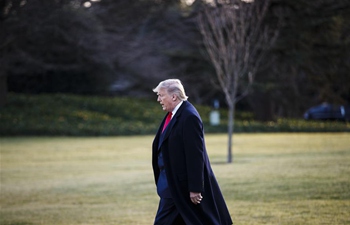WASHINGTON, Jan. 10 (Xinhua) -- U.S. job gains, along with wage growth, slowed down in 2019, with job growth expected to further decelerate in the year ahead as the labor market continues to tighten.
In 2019, payroll employment rose by 2.1 million, down from a growth of 2.7 million in 2018, the U.S. Bureau of Labor Statistics reported Friday. Divided by months, job gains averaged 175,000 in 2019, a sharp drop from 225,000 in 2018.
U.S. employers added fewer-than-expected 145,000 jobs in December, down from a revised 256,000 in November. After revisions, job gains averaged 184,000 over the last three months.
Meanwhile, the unemployment rate remained at 3.5 percent in December, a five-decade low. Participation rate in the labor market also held steady at 63.2 percent, "which is a disappointment," said Diane Swonk, chief economist at Grant Thornton, a major accounting firm.
"Prime-age participation has regained much of the ground lost to the crisis and years that followed, but remains well below the highs hit during the 1990s boom," said Swonk.
A new report from the U.S. Chamber of Commerce released earlier this week also shed light on the historically tight labor market conditions. The Monthly Workforce Monitor showed that the Worker Availability Ratio in October fell to 0.88, the lowest level recorded in the nearly 20-year history of the data series, meaning less than one available worker per job opening.
The monthly ratio fell from the record high of 7.99 in December 2010 and has averaged 2.84 over the history of the series since January 2001, the report showed.
"The data draw attention to an important but overshadowed 'gap' in the American workforce," said Ronald Bird, a senior economist at the chamber, noting that the nation faces not only a skills gap, but also a growing people gap.
Swonk highlighted the tepid wage growth, saying, "The key takeaway from 2019 is that tight labor markets continue to deliver on jobs, but not wages.
"Wages were accelerating much more rapidly during the 1990s than they are today, despite a higher unemployment rate then."
Over the last 12 months, average hourly earnings have increased by 2.9 percent. December marked the slowest year-on-year wage growth since July 2018.
"This has humbled the Federal Reserve (Fed), which expected more heat in wages given the low level of unemployment; this is a key reason we expect the Fed to cut again in 2020," said Swonk.
At an event in New York on Thursday, Fed Vice Chairman Richard Clarida said that the central bank's monetary policy is "in a good place," but provided no clue to the future direction of interest rates, merely reiterating that policy "is not on a preset course."
"As long as incoming information about the economy remains broadly consistent with this outlook, the current stance of monetary policy will likely remain appropriate," Clarida said. "Of course, if developments emerge that, in the future, trigger a material reassessment of our outlook, we will respond accordingly."
The Fed lowered interest rates three times in 2019, amid growing uncertainty stemming from trade tensions, weakness in global growth and muted inflation pressures. These policy adjustments put the current federal funds rate target range at 1.5 percent to 1.75 percent.
Gregory Daco, chief U.S. economist at Oxford Economics, wrote on Twitter that further moderation in job creation and persistently muted inflationary pressures will favor one more Fed rate cut in June, noting that he expects average monthly job growth to drop to 125,000 this year.
"(The) U.S. labor market continues to provide a solid foundation for the main pillar of growth: consumer spending," Daco said. "However, as in 2020, lingering global headwinds, policy uncertainty and cautious businesses are likely to restrain labor demand amid an increasingly tight labor market."













